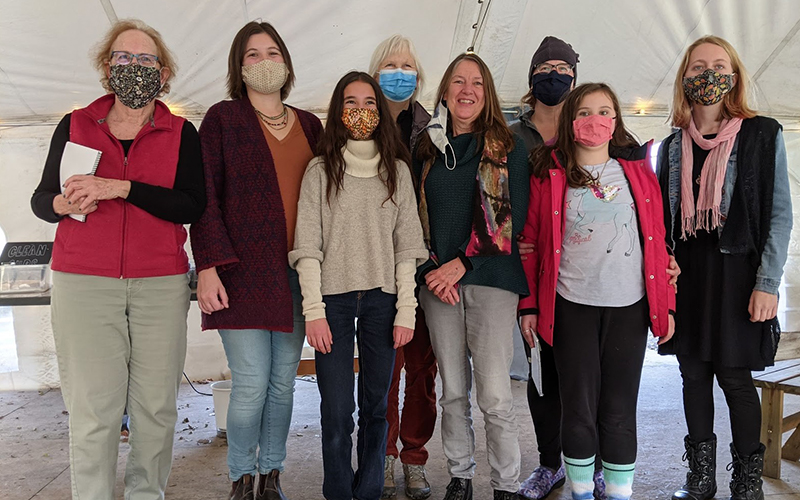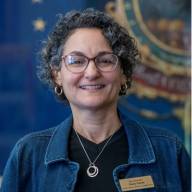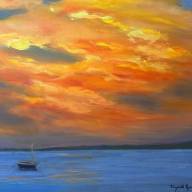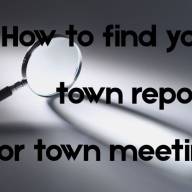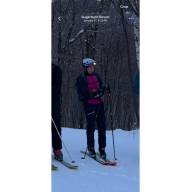By Beniamino Nardin, Harwood correspondent
“We hope this will give you the chance to get to know the poets and writers a little bit better,” said Amanda Gates, Warren librarian, as she introduced the event celebrating Mad River poets and their work in the anthology, “A Year Of Its Own,” the Mad River Valley Pandemic Story Project.
The event, held on Sunday, November 21, at Toast & Eggs in Waitsfield, under the tent provided hot tea and cider. There was mingling and smiles beneath masks.
Run by the Joslin Memorial Library, the Warren Public Library and the Moretown Public Library, this project was a celebration of the disbelief, confusion and beauty to be found within the time of the pandemic. Poems tackled themes of loss, identity and self-exploration during these unfamiliar times.
“Geckos scurry about as ambulance sirens sound in the distance,” read Susan Bauchner from her poem “A Day in the Pandemic,” which she wrote in Florida during its initial stages. “The sun sets as she says goodnight to her grandchildren on Zoom.”
Erika Nichols-Frazer, staff writer for The Valley Reporter, shared heartfelt poems on the trials and tribulations of lockdown. “Home is a place we built,” read Nichols-Frazer from her poem “Quarantined.” “Where are we safe?” She followed up with “The Year We Lost,” remarking that “The year we lost we waited for it to come.”
Laura Brines shared the very first poem she had written, “An Unexpected Gift,” when her mother, 93, was in a retirement community and Brines struggled with the uncertainty of the times. Brines wrote the poem as a “lift from the doldrums and fear of lockdown.” In her poem, she touched upon how a community of poets brought together relieved her of stress, “a treasured ritual that would never have happened” to her without the pandemic.
Twelve-year-old Harmony Belle Devoe shared poems of pride and hope, touching upon heavy subjects with moving intensity and grace. Devoe maintained that poetry had been a way for her to grow closer with her family over the course of the pandemic, that writing gave voice to her passion and that through her writing, she could express the sentiments she knew needed to be displayed. “Their wrongs will never be rights,” read Devoe from her poem “Almond Eyes,” written after a spike in egregious hate crimes against Asians. “We realize we must fight for these rights.”
Jennifer Hill and her daughter Julia both shared touching, poignant poems that highlighted the ways they coped with the pandemic. In her poem “Pandemic Birthday,” Julia Hill wrote about her hope that the pandemic would soon cease. “I hope that I get to hug and have a sleepover with my cousins and auntie,” read Hill. “And the pandemic will end.”
Jennifer Hill shared her poem, “Sunflower Promise,” about the rituals and daily gifts of recognition and gratitude that aided her as she maneuvers the pandemic. “As [the sunflower bush] grew, we felt more rooted in the world,” Hill read. “The birds came.”
Aurora Sharp, a student from Montpelier High School who designed “A Year of Its Own’s” cover, shared a poem titled “The Place Didn’t Change -- I Did.” The poem centered around the beauty of things that remain constant in a period of such inconstancy. “At least it isn’t gone yet,” read Sharp. “At least something hasn’t changed.”
Barbara Christie-Garvin shared her tribute to the silver lining of the pandemic, of the ways in which she began to learn to show appreciation for the world she inhabits. “COVID has been a blessing in disguise,” read Christie-Garvin from “Coming Home,” “allowing time to come home to myself again, to pause constant planning, outside distractions and noise, to check in and take stock of what and who I value most.” Christie-Garvin reflected on how she’d become a “student of life” during the pandemic, able to acknowledge things that she’d once taken for granted.
This anthology of poetry and stories, compiled by a triad of libraries, is a testament to the strength and sturdiness of the Mad River Valley community, of learning and growing through the toughest moments, channeling the most challenging moment into art that speaks to others with a life of its own, crossing borders and boundaries to unite each member of the community in an indelible knot of resilience.


